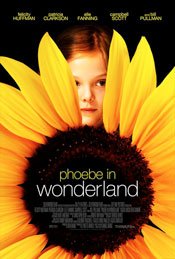"Alice Through a Dark Looking Glass"
| None | Light | Moderate | Heavy | |
|---|---|---|---|---|
| Language | ||||
| Violence | ||||
| Sex | ||||
| Nudity |
What You Need To Know:
For its dark subject, there is much whimsy in the storyline. The performances by the whole cast are very strong. The directing carries viewers into the world of this troubled young girl. However, a disbelief in God is stated and affirmed by the two young lead characters. Also, Phoebe’s young male friend plays with dolls and gets the part of the Queen in the play. Though rated PG-13 and containing relatively minor foul language and other negative elements, this is still a dark journey into mental illness that discerning viewers may find disturbing.
Content:
(HH, ABAB, B, Ro, PC, Ho, L, V, A, D, M) Strong humanist worldview with atheist statements of non-belief by main characters mixed with some moral elements such as a positive father figure, some possible Romantic implications, plus a politically correct homosexual subplot; two obscenities and three profanities; light violence when troubled protagonist spits on other children and has outbursts; no sexual content; no nudity; minor drinking of wine; smoking; and, an ineffectual authority figure.
More Detail:
PHOEBE IN WONDERLAND is an imaginative story of a nine-year-old girl who struggles with emotional issues while performing in a school production of “Alice in Wonderland.” Phoebe is artistic and creative. Her writer mother strongly encourages her unique perspective on life. However, as the production of the play continues, it becomes apparent that Phoebe is struggling with mental illness issues.
Phoebe begins to blurt out inappropriate things, spits on other children and other acts which she says she “can’t help.” Phoebe finds the theater and her Drama teacher to be the only sanctuary from her troubling thoughts and actions. She performs rituals of stepping certain ways and clapping to make sure she gets the part in the play and then continues them so that she doesn’t lose the part. When the ineffectual principal takes Phoebe out of the play, Phoebe’s fantasies become more frequent as characters in her real life appear dressed as characters from “Alice in Wonderland.” Finally, the source of Phoebe’s outbursts and anti-social behavior become apparent as her parents begin to help her with psychiatric treatment.
For its somewhat dark subject matter, there is much whimsy in the storyline. Phoebe becoming more like Alice is fun and, in the end, the imaginary “Alice” waves and approves of Phoebe. The performances by the whole cast are very strong and the directing carries viewers into the world of this troubled young girl.
There are a number of worrisome elements, however. The first is that Phoebe and her young friend Jamie express their desire to get roles in the play and consider praying. Phoebe and he both say they don’t believe in God, so instead, they superstitiously think they have to do difficult things which will help them get the role.
Jamie, a young boy, discusses playing with dolls and tries out for and receives the part of the Queen in the play. When the other kids call him a homosexual slur, the Drama teacher explains that in Shakespeare’s day all the great women roles were played by men. The story never says that young Jamie is a homosexual, but the movie makes it clear that this is his “orientation.”
The principal is not wise and a poor example of authority. In a mild rebellion to him, the cast continues to perform the play, even when the Drama teacher is fired. The principal teach the children poorly and disrespectfully. This prince is clearly not a pal.
Though rated PG-13 and containing (relatively) minor foul language and other negative elements, PHOEBE IN WONDERLAND is still a dark journey into mental illness that young teenagers and other discerning viewers may find disturbing.
Now more than ever we’re bombarded by darkness in media, movies, and TV. Movieguide® has fought back for almost 40 years, working within Hollywood to propel uplifting and positive content. We’re proud to say we’ve collaborated with some of the top industry players to influence and redeem entertainment for Jesus. Still, the most influential person in Hollywood is you. The viewer.
What you listen to, watch, and read has power. Movieguide® wants to give you the resources to empower the good and the beautiful. But we can’t do it alone. We need your support.
You can make a difference with as little as $7. It takes only a moment. If you can, consider supporting our ministry with a monthly gift. Thank you.
Movieguide® is a 501c3 and all donations are tax deductible.

Now more than ever we’re bombarded by darkness in media, movies, and TV. Movieguide® has fought back for almost 40 years, working within Hollywood to propel uplifting and positive content. We’re proud to say we’ve collaborated with some of the top industry players to influence and redeem entertainment for Jesus. Still, the most influential person in Hollywood is you. The viewer.
What you listen to, watch, and read has power. Movieguide® wants to give you the resources to empower the good and the beautiful. But we can’t do it alone. We need your support.
You can make a difference with as little as $7. It takes only a moment. If you can, consider supporting our ministry with a monthly gift. Thank you.
Movieguide® is a 501c3 and all donations are tax deductible.





